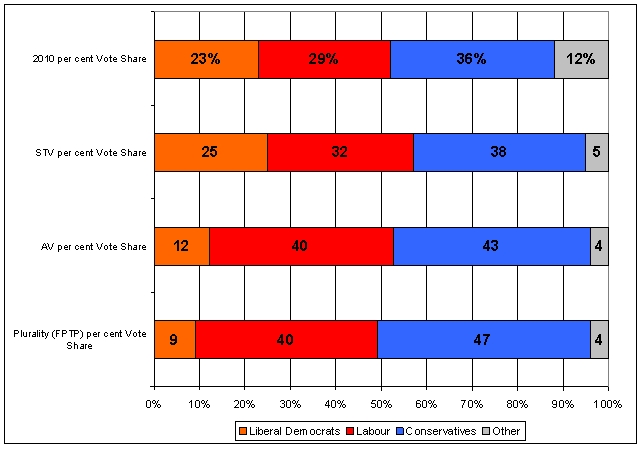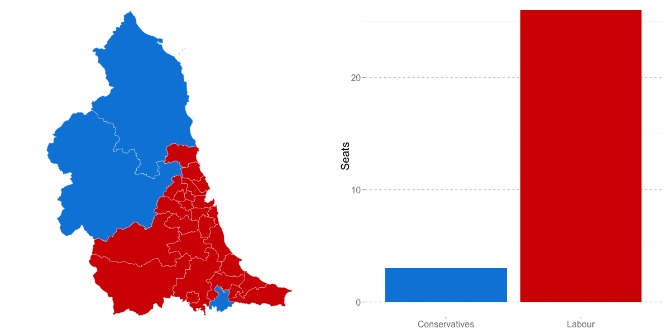 Political ignorance is one of the most important features of the British – or any other – public. As the general election approaches, we may be moved to ask how competent the average voter really is. But, as Simon Kaye explains in this article, the relationship between democracy and ignorance is extremely complicated, and calls for sophisticated political analysis.
Political ignorance is one of the most important features of the British – or any other – public. As the general election approaches, we may be moved to ask how competent the average voter really is. But, as Simon Kaye explains in this article, the relationship between democracy and ignorance is extremely complicated, and calls for sophisticated political analysis.
In the run-up to a general election, it is a grand tradition for us to experience a collective crisis of confidence over the weak political knowledge of would-be voters. The Independent‘s buzzfeed-imitating i100 site recently set out some evidence of this sort, reporting that 46 per cent of the respondents to a survey were unaware that a general election is taking place this year, 57 per cent were unaware of what a general election is, and 59 per cent could not name the current British Prime Minister.
How trustworthy is this evidence? Methodologically speaking, not very trustworthy at all. As i100 noted, the 1900-odd responses that produced these statistics were an unweighted sample, quizzed via email by a voucher codes website. It’s likely, then, that all we are learning about here is the political ignorance of particularly savings-savvy people with a bit of time on their hands. We should be wary of extrapolating such information into a generalised indictment of the state of public political knowledge.
But are these statistics outliers? Do they fail to correspond with existing (more sound) empirics on similar questions? Would an expert on public opinion be surprised by these findings? Not really. While most research around public ignorance arises from surveys conducted in the USA, there’s a growing body of work concerned with the UK context as well, and the majority of such evidence confirms the realism of the statistics set out above.
Recently, a survey for the Royal Statistical Society and KCL gave a powerful impression of the extent of public ignorance over social affairs and politics, finding, among other things, that:
- British people thought under-age pregnancies to be 25 times more common than they actually are
- They also thought that the severity of benefit fraud is 24 times worse than in reality
- 29 per cent of those surveyed thought that Jobseekers’ Allowance is more expensive to the taxpayer than pensions, when the latter costs about 15 times more
- In general, people thought that crime and violent crime rates were rising, when in fact they have been falling for decades
- British people systematically over-estimated immigration rates.
These findings are particularly interesting in that they seem to indicate a kind of pessimistic bias in British political ignorance. Is it possible that in many of these areas we imagine things to be ‘worse’ than they actually are because of the media and cultural landscape in which we find ourselves? In a more balanced informational environment, would we cease to be wrong, or simply cease to be wrong in a systematically pessimistic way?
But objective and depoliticised ignorance is just as persistent as that which may be explained away by the cognitive biases of political partiality. Scientific knowledge levels are a good indicator if we are interested in measuring the epistemic ‘competence’ of voters while controlling for the effects of systematic political misinformation, and the scientific ignorance of the general public is measured quite frequently by polling in the UK. The evidence here is just as worrying: a 1999 Gallup poll, for example, found that 33 per cent of British people gave the wrong answer or claimed to have ‘no opinion’ when asked whether the Earth revolves around the sun, trailing behind people in the US (21 per cent ignorant) and Germany (26 per cent).
It is clear, then, that there’s no need to turn to i100‘s problematic sources if we want to get a sense of the ‘knowledge problems’ at work in British democracy – but we needn’t dismiss those findings as unrealistic, either.
Why is this important? Concerns raised by a drastically politically ignorant public extend beyond the simple possibility that it will make bad choices when voting. Ignorant voters may also be more easily misled or manipulated by rhetorically impressive but factually unsound claims. They may fall back upon sources of democratic advice that don’t quite measure up to more detailed understanding. They might be more prone to accept conspiracy theories, or fall into patterns where they accept overly dichotomous or extremely simplified versions of reality. Why should fundamental decisions – say, over the best political party for the management of immigration – be entrusted to a public that is generally mistaken about the fundamental facts of immigration and demography in the UK?
This (plentifully controversial) book by Ilya Somin, among a variety of recent interventions in US political science intended to discuss the scale and implications of political ignorance in voting publics, also explains some of the limitations of the kinds of policies we imagine might be useful to combat ignorance. Somin suggests that education may theoretically promote greater levels of political knowledge, but could also establish centrally-determined biases in the way that the public perceives political problems (a problem that could, at worst, amount to ‘brainwashing’). Jason Brennan and Bryan Caplan have argued, in different ways, for franchise limitation, suggesting that those who vote should be those who are confident of voting well. But establishing an objective benchmark for determining qualified voters from unqualified would be an exercise in elitism and absolutism, especially since so many political questions do not have readily apparent ‘right’ and ‘wrong’ answers.
Deliberative and participatory democrats argue that mass democracy is an implicitly valuable practice, and one that will necessarily result in the pooling and sharing of information. This response may be right in another way, too: by increasing the participatory efficacy of voters, we could also incentivise them to take on more of the opportunity costs that are accrued by the effort to become politically educated. This might add up to an argument for more direct democracy and a more proportional electoral system, but even innovations such as these will not greatly increase the actual importance of individual voters within a mass democracy, leaving incentive structures much as they stand today.
The fact of public ignorance may interact in some surprising ways with the other features of political behaviour. Within the British context, the extent of such ignorance may help us to make peace with the various systemic and electoral features of our political establishment that make the public far less influential and more prone to apathy than they might imagine or prefer themselves to be. After all, what’s the value of a more responsive, proportional, direct electoral system – of more democracy – if the wider citizenry is still not strongly incentivised to vote knoweldgeably?
Meanwhile, it seems plausible that the probability of limited information and tight epistemic constraints are factored-in to the version of democracy practiced in the UK, where we defer to representatives for choice-making, effectively ‘outsourcing’ the costly business of political expertise to a specialised group. The ignorance and manipulations of the political class therefore rightly become the primary subjects of our scrutiny.
Political analysis, if it is to have meaning, should take the ignorance of democratic citizens seriously – but it should also probably take it as a non-negotiable feature of the way that democracies work in the era of mass voting publics.
Note: This article gives the views of the author, and not the position of the General Election blog, nor of the London School of Economics. Please read our comments policy before posting.
 Simon Kaye is Parliament and Politics Lecturer at the Hansard Society’s Scholars Programme, and also teaches at King’s College London’s Department of Political Economy, where he received his PhD in Political Theory. You can see his research on his Academia.edu page. He writes at www.britishdemocracy.com and tweets from @stkaye.
Simon Kaye is Parliament and Politics Lecturer at the Hansard Society’s Scholars Programme, and also teaches at King’s College London’s Department of Political Economy, where he received his PhD in Political Theory. You can see his research on his Academia.edu page. He writes at www.britishdemocracy.com and tweets from @stkaye.








Interesting article on a very important topic. I wonder however if the significance of ignorance in actual decisions made is not being overstated. After all, the outcomes are not as poor as the ignorance would suggest they might be. In this i refer you to the jury system. The same ignorant people are asked to make judgements on the liberty of their fellow citizens having considered the evidence presented to them and guidance from the judge as to points of law. By and large this system seems to work well (and maybe some comparison would be informative) but the people are the same ignorant citizens prone to pessimistic bias and outright prejudice. The process of discussion and sense of responsibility coupled with evidence and guidance seems to produce typically correct outcomes. if anything the jury system favours the citizen. There maybe social psychological insights to be gained from the jury system that are transferable to the democratic government process. Moreover, the jury system may help explain why the democratic process produces less bad outcomes than the level of ignorance would suggest it should.
Very interesting piece – what moves me most is the question of conventional media’s role in keeping us stupid, a role that I think is highly desirable for the main beneficiaries of the existing system.
That is not to deal in conspiracy theories but rather to work on the basis on following the money. How could our dumbness not serves their interests?
It pays a small elite to keep people stupid and conventional media are a spectacularly effective way of keeping us that way. People must invest considerable time and energy to lift their brains out of the status quo cage as created by mass propaganda – ideas of “economic growth” as being a good thing probably being among the most pernicious.
There is a great deal of disingenuous use of the term “democracy” by those in power. Part of the process of our self-education is to dig through that wooly term to its fundamentals and then to start rebuilding fromt he ground up, using ideas of government by the people. That certainly leads to conclusions favoring more direct and participatory governance systems.
Needless to say – I talk at length about all this, from my professional experience of both media and politicians – in Fraudcast News.
In the spirit of popular education, and its pressing necessity for us all, you can get a free PDF from fraudcastnews.net/en/ or else buy the thing in paperback from here http://www.hive.co.uk/search/fraudcast+news/mediatype/all/.